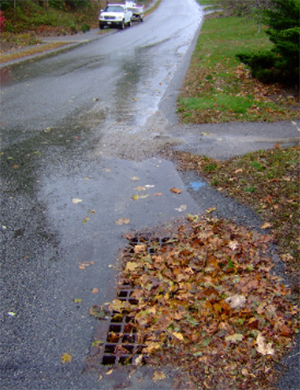Stormwater Management
Protecting water quality is critical to maintaining the integrity of Cape Cod’s public water supplies, swimming beaches, shellfish, aquaculture, and recreational resources. While water pollution is often associated with industrial activities and maritime accidents, stormwater runoff from developed areas is a major contributor to the problem. Excess fertilizers and insecticides and the harmful chemicals that accumulate on roofs, pavement and other impervious surfaces, are transported by stormwater to surface and ground waters. This runoff severely degrades water quality, harming the ecology of coastal waters and threatening public health.

Protecting water quality is critical to maintaining the integrity of Cape Cod’s public water supplies, swimming beaches, shellfish, aquaculture, and recreational resources. While water pollution is often associated with industrial activities and maritime accidents, stormwater runoff from developed areas is a major contributor to the problem. Excess fertilizers and insecticides and the harmful chemicals that accumulate on roofs, pavement and other impervious surfaces, are transported by stormwater to surface and ground waters. This runoff severely degrades water quality, harming the ecology of coastal waters and threatening public health.
While federal and state water quality standards require communities to treat and manage stormwater, municipal stormwater management requires an investment in trained staff, infrastructure improvements, maintenance, and management systems.
Finding the funding to manage stormwater runoff to meet water quality standards is a challenge.
Traditional sources of funding (state and federal grants) are typically not enough to address all of a community’s stormwater management needs. In recent years, communities across the country have adopted stormwater utilities as a way to create adequate funding for comprehensive municipal stormwater management programs. These utilities have proven to be a successful way for cities and towns to fund stormwater programs that will bring communities into compliance with federal regulations for non-point source pollution under the Clean Water Act.
To help communities meet these stormwater management challenges, APCC and the Mass Bays Program provided outreach workshops for municipal officials and other interested groups on the benefits of stormwater utilities and Low Impact Development (LID) approaches to managing stormwater. These workshops and other outreach events are offered in partnership with the Barnstable County Coastal Resources Committee.
APCC is also working with towns and communities across the Cape to support compliance with the new federal regulations for non-point source pollution, to improve collaboration across towns through the stormwater managers group, to complete planning and construction of new stormwater treatment systems, to improve maintenance of existing systems, and to provide ongoing education and outreach about the benefits of green infrastructure and eco-landscaping.
In 2023, APCC worked with the town of Yarmouth and Horsley Witten Group to complete an initial stormwater management plan including assessment, prioritization and concept designs to address runoff in areas south of Route 6. The following video is a recording of the public meeting held June 13, 2023 to introduce the project and review concept designs for top ranking sites. This project has been funded by a grant to the town from the MA Office of Coastal Zone Management.
Stormwater 101
The Association to Preserve Cape Cod and the town of Barnstable have partnered through Barnstable Channel 18 to create a series of informational videos. The goal of the series is to educate and inform members of the public about what they can do to help keep our waters clean. The first video in the series provides an introduction to stormwater management. Stormwater 101!
